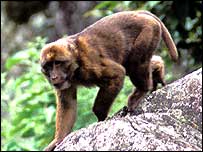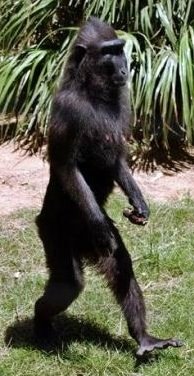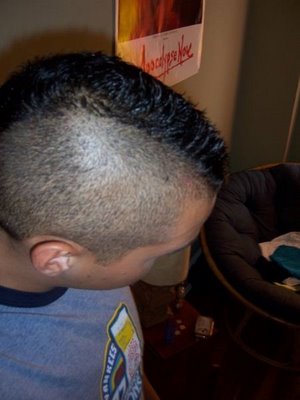of man and monkey
 The macaque (genus Macaca) is the second most widespread primate genus on earth, with twenty-two species recognized. These are the monkeys that most people think of, like the Barbary Ape and the Rhesus Monkey. Their habitats range across the Eastern Hemisphere from Gibraltar to Japan and many find a home in the laboratories of the Western world. The Rhesus macaque, for instance, was the first cloned and first transgenic primate. As recent as 2004, new species were being discovered in the macaque genus. The most famous macaque is Natasha, who lives in a zoo in Tel Aviv. After a stomach flu that almost killed her, she began to walk solely on her hind legs and never on all four limbs, a behavior never before observed in monkeys. An NPR commentator mused that she was both a symbol of the strange power of evolution and a political statement urging a revival of the stalled Middle East peace talks.
The macaque (genus Macaca) is the second most widespread primate genus on earth, with twenty-two species recognized. These are the monkeys that most people think of, like the Barbary Ape and the Rhesus Monkey. Their habitats range across the Eastern Hemisphere from Gibraltar to Japan and many find a home in the laboratories of the Western world. The Rhesus macaque, for instance, was the first cloned and first transgenic primate. As recent as 2004, new species were being discovered in the macaque genus. The most famous macaque is Natasha, who lives in a zoo in Tel Aviv. After a stomach flu that almost killed her, she began to walk solely on her hind legs and never on all four limbs, a behavior never before observed in monkeys. An NPR commentator mused that she was both a symbol of the strange power of evolution and a political statement urging a revival of the stalled Middle East peace talks.
Their is a more pejorative sense of the word macaca or macaque, which is in the tradition of referring to dark-skinned people as monkeys and apes, or subhuman and not sapient. It was in this sense that Senator George Allen of Virginia used the word macaca to repeatedly refer to an Indian-American staffer on his opponent Jim Webb's campaign at a rally last Friday. Since macaca has been the word for monkey since Latin times, it is considered in many cultures as a slur against North Africans. Allen singled out the staffer during his speech in Breaks, Virginia, near the Kentucky border.

On Monday evening, Allen issued a non-apologetic apology:
"I would never want to demean him as an individual. I do apologize if he's offended by that. That was no way the point."Asked what exactly the point was, Allen replied that he did not know what the word meant. He tried desperately to backfill that this nickname came from his staff and referred to the Webb staffer's haircut, which he claimed was a Mohawk. Although of Indian descent, the staffer, S.R. Sidrath was born and raised in Fairfax County, Virginia, unlike Senator Allen, who grew up in California. Note that all photographic evidence suggests that Sidarth, has his hair coiffed in a style that even the most ignorant person would NOT refer to as a mohawk, much less not know how to pronounce the word mohawk.
 A mohawk(or a 'mohican', as last of the, in British English) refers to a style of haircut which is thought to have been worn by members of the Mohawk tribe of Native American, consisting of shaving the hair from the sides and top leaving only a central stripe of hair down the middle of the scalp.
A mohawk(or a 'mohican', as last of the, in British English) refers to a style of haircut which is thought to have been worn by members of the Mohawk tribe of Native American, consisting of shaving the hair from the sides and top leaving only a central stripe of hair down the middle of the scalp. The Mohawks or as they call themselves the Kanienkehaka (meaning "People of the Place of the Crystals") are thought to have received their name either through the mistranslation of their real name by Hessian mercenaries fighting with British troops or from a combination of the slurs of rival tribes the Naragansett and the Unami, who called them man-eating monsters. This style was only used among the Mohawk people when they were going into battle, as the hair was considered a connection to the creator. Keeping a small strip of hair thus was a method of retaining their a small bit of their spirituality while not taking all of it with them. They lived in the area between Vermont and the St. Lawrence river in Canada.
The Mohawks or as they call themselves the Kanienkehaka (meaning "People of the Place of the Crystals") are thought to have received their name either through the mistranslation of their real name by Hessian mercenaries fighting with British troops or from a combination of the slurs of rival tribes the Naragansett and the Unami, who called them man-eating monsters. This style was only used among the Mohawk people when they were going into battle, as the hair was considered a connection to the creator. Keeping a small strip of hair thus was a method of retaining their a small bit of their spirituality while not taking all of it with them. They lived in the area between Vermont and the St. Lawrence river in Canada.In my hometown (Millis, Massachusetts), the Mohawk is the high school mascot. Unlike most people outside of the punk scene and the Airborne Rangers, I saw people with their hair carved into Mohawks (to show school sprit) quite regularly through high school. There is no record, however, of the Mohawk nation living in the Millis area. It was instead home to some of the nomadic people of the Naragansett nation before they were driven off the land by British colonists (with the help of Mohawks) in King Phillip's War, including a number of my direct ancestors.
After insulting Sidrath's humanity with his dog-whistle appeal, Allen then tried his best grouchy old xenophobe schtick, telling Sidarth welcome "to the real world". Unsurprisingly, at the same rally there were no other people of color among the 100 or so Republican supporters.
Republican officials tried to lend cover by saying that people here don't think its racist:
"I didn't have a clue what it meant, and I doubt Allen did, either."Allen appears to not know why he does alot of things until his staff can think of something suitably unctious spin, like calling the prominently displayed Confederate flag in his cabin, just part of a collection and the Confederate flag pin on his lapel in his high school yearbook photo a 'statement about his rebellious nature'.
Dog-whistle politics is a type of political campaigning which is "only heard" by a specific intended audience, like a dog whistle, which are built in such a way that humans cannot hear them due to their high frequency, but dogs can. The term is thought to have been introduced to the United Kingdom by Lynton Crosby, where it played a role in the 2005 general election; Michael Howard was often accused of practising "dog-whistle politics" on contentious subjects like immigration, with a campaign slogan that asked "Are you thinking what we're thinking?". In the US, they are euphemisized as 'wedge issues', but almost always it involves some sort of veiled racist slur, some element of Coulterkampf. Allen is aiming for those voters, which may help in in ol' Virginny, but not for the rest of our multiethnic nation.
UPDATE:
This is too good not to add. Apparently Senator Allen, that faux good ol' boy, knows exactly what 'macaque' means across the French speaking world. As TNR's Ryan Lizza notes:
Not only is macaque apparently a French slur used to describe North Africans, Allen would have good reason to know it is. His mother is French Tunisian (yeah, that's in North Africa), and Allen speaks French.
Español | Deutsche | Français | Italiano | Português| Ch| Jp| Ko







0 Comments: